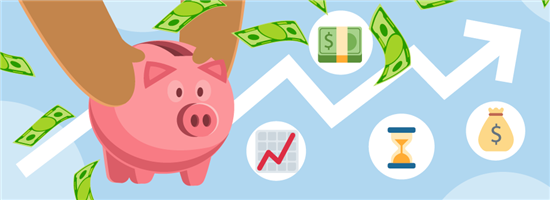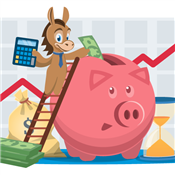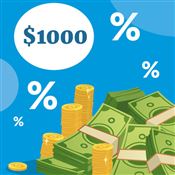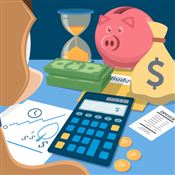High Yield Savings Calculator
Ad Disclosure: This article contains references to products from our partners. We may receive compensation if you apply or shop through links in our content. This compensation may impact how and where products appear on this site. You help support CreditDonkey by using our links.
How much can your money grow in a high-yield savings account? Use this free savings calculator to see how much you'll earn over time.
 |
How to Use High-Yield Savings Calculator
You can use this savings calculator to see how much you can earn with different APY and initial deposits. All you need to do is input the following:
- Initial Balance: starting amount you deposited in the savings account.
- Monthly Contribution: amount you plan to deposit into your account every month.
- Years to Grow: how long you plan to grow your savings.
- APY: the annual percentage you expect to earn from your account.
Once entered, click Calculate to view the total interest earned and ending balance.
For most high-yield savings accounts, interest is typically compounded daily and credited monthly. However, it varies depending on the bank you choose.
How Much Will $1000 Make in a High-Yield Savings Account?
If you maintain $1,000 in your high-yield savings account with a 4.50% APY, you can earn around $45 in 12 months. But, this can still increase if you regularly deposit to the account.
Ultimately, how much you can make depends on factors like the starting amount, interest rate, additional contributions, and how long you save.
High-yield savings accounts typically offer rates that are 8x to 10x higher than the national average rate.[1] However, your interest earnings depend on various factors such as the APY and how much you put in the account.
What is a High-Yield Savings Account?
A high-yield savings account is just like a regular savings account except it pays higher interest. However, the rates are variable so they can change over time.
Some may have minimum balance requirements or monthly fees, but many do not. You can also easily make withdrawals and deposits, though in-person options vary.
You can typically find the best deals from online banks and credit unions. This is because they have fewer (or no) branches, which helps them save money and offer better rates.
Here are some of the highest APY high-yield savings accounts for April 2024:
- Fitness Savings:
Up to 4.45% APY - Newtek Bank:
Personal High Yield Savings Account - 4.35% APY - Axos ONE:
Earn up to 4.31% APY - Jenius Bank:
High-Yield Savings Account - 4.05% APY - LendingClub Bank:
High-Yield Savings - 4.00% APY
How to Choose a High-Yield Savings Account
Here are some factors to consider to find the best high-yield savings account for you:
- APY
Compare the interest rates of different banks and credit unions. But, be careful because the highest rates may have restrictions that aren't worth it in the long run. - Monthly Fees
A smart thing to do is to choose a bank without monthly fees. You can also pick one where you can avoid them by meeting criteria or maintaining a specific balance. - Balance Requirements
Check if you need to maintain a certain balance to earn the highest APY. It would be best to go for a high-yield savings account with a good rate that applies to all balances. - Digital Banking
Since most high-yield savings accounts are offered by online banks, choose one with a user-friendly online banking platform. Check the app or platform ratings and see what features they offer to help you decide.
Axos ONE - Earn up to 4.31% APY
- Minimum Deposit Required: $0
- Monthly Fee: No monthly maintenance fee
- APY: Up to 4.31% on savings and 0.51% APY on checking
The interest earned in a high-yield savings account is usually compounded. Compound interest refers to the interest you earn on an investment, on top of the interest you've already earned. It makes your money grow faster over time.
Can You Lose Money in a High-Yield Savings Account?
Generally, you cannot lose money in a high-yield savings account. As long as your chosen bank or credit union is insured by the FDIC or the NCUA, deposits are protected up to $250,000 per depositor, per ownership category.[2][3]
However, note that monthly maintenance fees and other charges can affect your earnings and potentially reduce your balance.
Yes, the interest you earn in a high-yield savings account is subject to tax. It is considered as taxable income by the IRS so you have to fill out a tax form and report payments of interest if your totals exceed $10.[4]
High-Yield Savings Account Alternatives
If you're looking for other ways to boost your savings, consider the following alternatives:
- Certificate of Deposit
CDs are ideal for those who prefer earning a fixed rate. However, in exchange, your money will be locked up for a specific period. If you access or withdraw your funds prematurely, you'll have to pay early withdrawal penalties. - High-Yield Checking Account
A high-yield checking account is perfect for those who want to earn interest on their spending balance. It offers a decent APY and convenient access to your funds through a debit card. However, this kind of account is not very common.What are the best high-yield checking accounts?- Axos ONE:
Earn up to 4.31% APY - UFB Freedom Checking & Savings:
Unlock Up to 3.46% APY - Bluevine:
Premier Business Checking - 3.00% APY
- Axos ONE:
- Bonds
Bonds are a good option for those who want slightly riskier investments for higher returns. You lend money to companies or government entities and, in return, they pay interest regularly. Earnings depend on the bond's market price and interest rate.
Each investment has its fair share of pros and cons. The best option depends on your financial goals, your risk tolerance, and how long you plan to invest. But, bonds, CDs, high-yield savings, and dividend stocks are some options with good returns.
Bottom Line
A high-yield savings account is a safe and flexible investment, perfect for those who prefer low-risk options. It is an effortless way to earn extra money, especially with consistent contributions.
You can even use tools, like a savings calculator or a budget calculator, to help you on your financial management journey.
References
- ^ FDIC. National Rates and Rate Caps, Retrieved 02/20/2024
- ^ FDIC. Your Insured Deposits, Retrieved 03/01/2024
- ^ NCUA. How Your Accounts are Federally Insured, Retrieved 03/01/2024
- ^ IRS. Topic No. 403 Interest Received, Retrieved 03/01/2024
Note: This website is made possible through financial relationships with some of the products and services mentioned on this site. We may receive compensation if you shop through links in our content. You do not have to use our links, but you help support CreditDonkey if you do.
|
|
| ||||||
|
|
|











